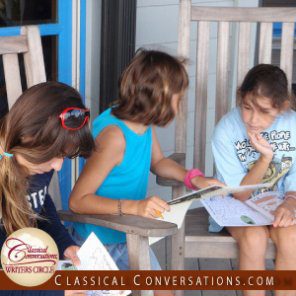“Men’s natures are alike; it is their habits that carry them far apart.”
Confucius (551–479 BC)
Habits are not set in an instant. Instead they take weeks, months, or years to form. Taking the time to develop excellent habits of the mind blesses the thinker both personally and publically. Mathematics trains the mind to think serially at first, and then to branch out into creative problem solving. Literature study, the study of humane letters, enables the mind to ponder virtue. Latin combines the best of mathematics study, problem solving, and literature study, allowing students to ponder virtue by translating difficult texts from Latin to English. As students wrestle with parsing and contextual translating, they are also considering the thoughts of Cicero, Caesar, and other great rhetoricians.
Classical Conversations students prepare for this exciting Latin journey by embarking on a three-year in-depth study of the English language in licensed Essentials programs. After Essentials, students begin applying what they have learned in licensed Challenge A programs, exploring foundational Latin paradigms and vocabulary. The Essentials program equips a student to enter a Challenge A Latin seminar in three ways: mastery of English grammar vocabulary, exposure to grammar skills, and development of excellent habits.
For twenty-four weeks, Essentials students are introduced to a very special kind of vocabulary, the vocabulary of English grammar. Students learn how to identify and modify nouns and verbs as well as to compare and contrast adjectives and adverbs. The memorization of the different types of adjectives in particular helps Challenge A students to properly use the Latin ablative case. After three years of Essentials training, students find that direct objects, indirect objects, and objects of prepositions are not frightening monsters to run away from, but instead are parts of a sentence that can be identified, mastered, and then used to communicate ideas more beautifully. Challenge A Latin students no longer struggle to use the Henle textbook or to translate simple Latin sentences because of their background in these powerful pieces of English grammar vocabulary.
As Essentials students mature during their three-year tour, they are also exposed to beneficial grammar skills. The conversational form and flow of the Essentials classroom opens the door to dialectic thought. Students learn to ask questions to identify the jobs of English words. These jobs in English are equivalent to the Latin cases that determine the spelling of all Latin nouns and adjectives. During an Essentials class, tutors model good grammar and style, and students are encouraged to imitate. While students might not realize it, the Essentials Quid et Quo exercises prepare them for parsing Latin nouns, adjectives, and verbs in Challenge A. Diagramming English sentences week after week trains young minds to think about sentences in their most basic parts, by breaking them down to kernels of communication with modifiers hanging here and there like glass Christmas ornaments. Students observe that words can have more than one role in English, which begins to prepare them for the detective work needed for the more complex Latin translations they will encounter later.
Developing excellent study habits takes young students a long time. During the course of Essentials, proper study habits are modeled each week for students and parents. The foundation of Essentials is the memorization of English grammar charts. After practicing how to memorize charts in Essentials, Challenge A students can easily transfer that study skill to memorizing Latin noun and adjective declension charts, verb conjugation charts, and pronoun charts. Students’ minds, trained to store large bodies of organized information, will find the smaller Latin charts easy and perhaps even pleasurable to learn. Studying the orderly charts week after week may illuminate for some Challenge A students the orderly creator God.
Essentials also challenges students to begin a lifestyle of time management. While charts and essays could be copied and edited endlessly, the Essentials student learns there are due dates. Students learn how to manage multiple assignments as well. Before Essentials, students only have memory work each week with some additional reading and mathematics instruction. With Essentials, two more subjects, English grammar and composition, are added to the school day. This is excellent preparation for the Challenge student who will have six seminars of material to study daily.
The Essentials program equips a student to enter a Challenge A Latin seminar through the mastery of English grammar vocabulary, exposure to grammar skills, and development of excellent habits. Parents taking advantage of the entire scope of the Essentials program give their budding Challenge A students a trustworthy foundation for their adventures in Latin. Challenge A Latin ushers students into a journey that will culminate with discussions of honor, sacrifice, and integrity. These conversations are facilitated by the humble beginnings in the Essentials classroom, as students master the English language and good habits.




